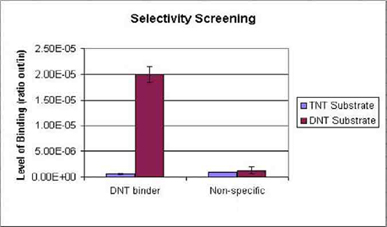APPLICATIONS OF TECHNOLOGY:

Comparative binding assay data suggests the levels of binding to TNT for the DNT designated receptor are on the order of non-specific interaction, confirming that the designated receptor is indeed selective for the DNT target. The selectivity between TNT and DNT is significant since the two chemicals differ from each other by only one nitro group.
Sensing
- explosives, e.g. TNT, DNT
- chemical and biological warfare agents
- indoor and outdoor environmental toxins
- pesticides
ADVANTAGES:
- Reduces false positives caused by humidity
- Can be applied to a variety of ligand-receptor binding sensor platforms
- Provides highly selective TNT and DNT receptors
- Portable and low cost
DESCRIPTION:
Miniaturized chemical sensors that emulate the olfactory system are being developed to detect explosives, chemical and biological warfare agents, industrial carcinogens and environmental toxicants, and food spoilage, as well as to monitor health and make medical diagnoses. Devices and systems that are most amenable to miniaturization are based on ligand-receptor binding. While there are several highly sensitive ways to convert ligand-receptor binding to electrical or optical signals, the lack of selectivity has been a key challenge in the past, making such sensors ineffective due to false positives.
Arunava Majumdar, Seung-Wuk Lee, and colleagues at Berkeley Lab have developed a polymer membrane that can be applied to a variety of sensor platforms to help solve this selectivity problem. Receptors are linked to the polymer so that the system is insensitive to humidity changes. This membrane-receptor coating can be readily used with any number of molecular recognition platforms, including cantilever and surface plasmon resonance. The membrane is compatible with protein, peptide, nucleic acid, carbohydrate, or lipid receptors.
The Berkeley Lab researchers have also developed a series of high affinity receptors of TNT and DNT based on sequence specific polymers. For more information on these receptors see the publication link below.
STATUS: Issued U. S. Patent # 8,957,013. Available for licensing.
FOR MORE INFORMATION:
REFERENCE NUMBER: IB-2349
SEE THESE OTHER BERKELEY LAB TECHNOLOGIES IN THIS FIELD:
- Color and Shape Changing Polymeric Ribbons and Sheets
- Miniature Airborne Particle Mass Monitors
- Nanoresonator for Precise Position and Mass Sensing